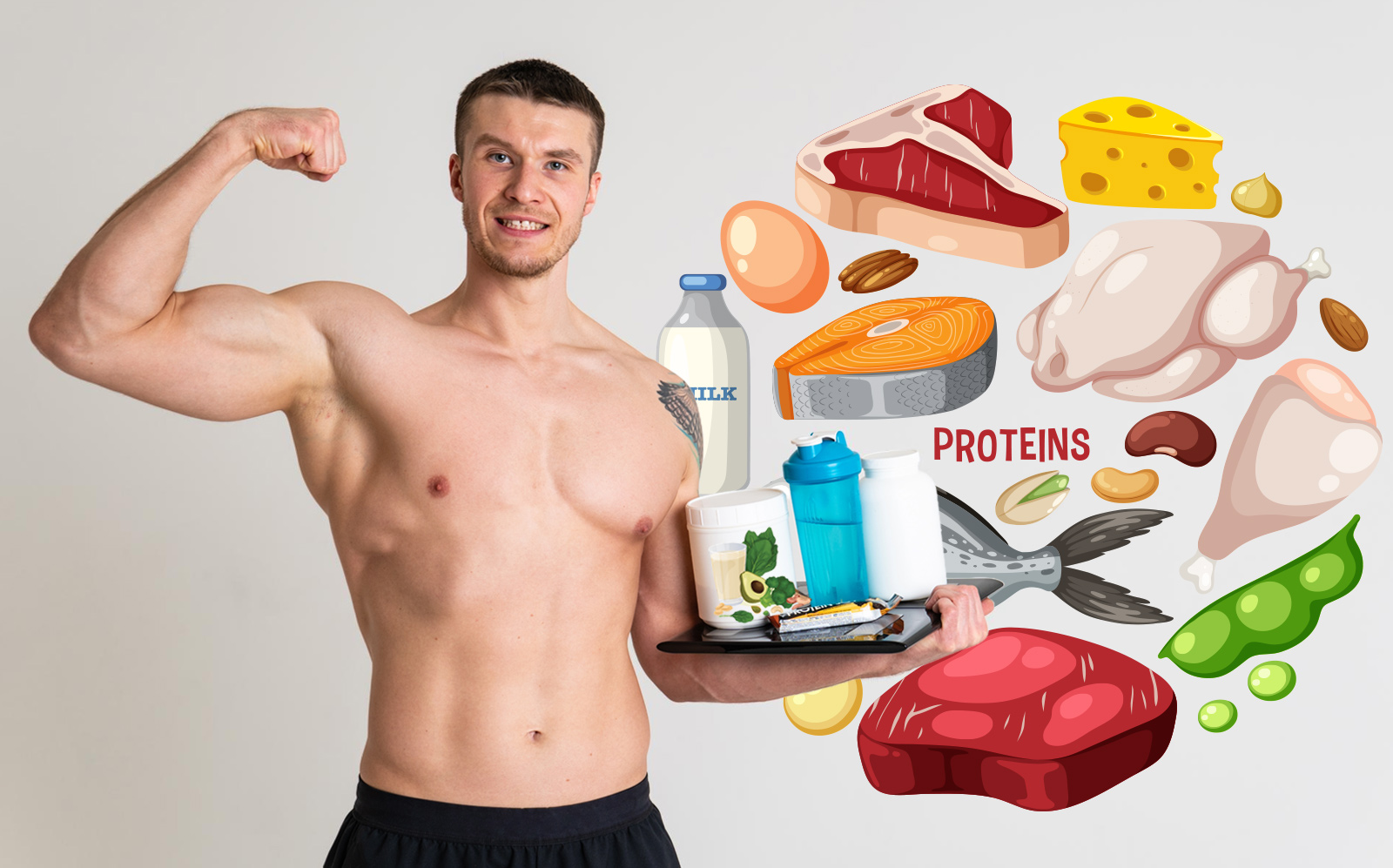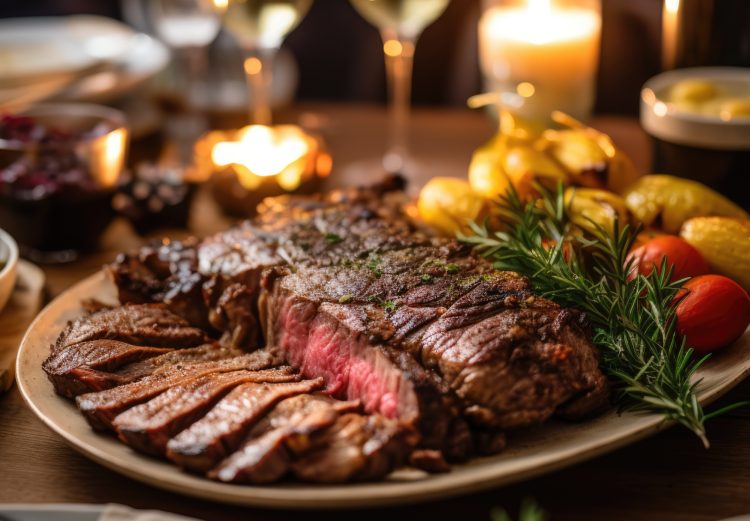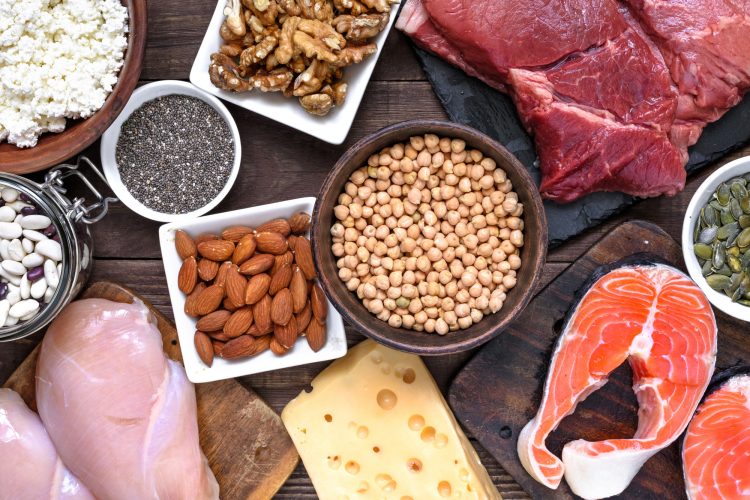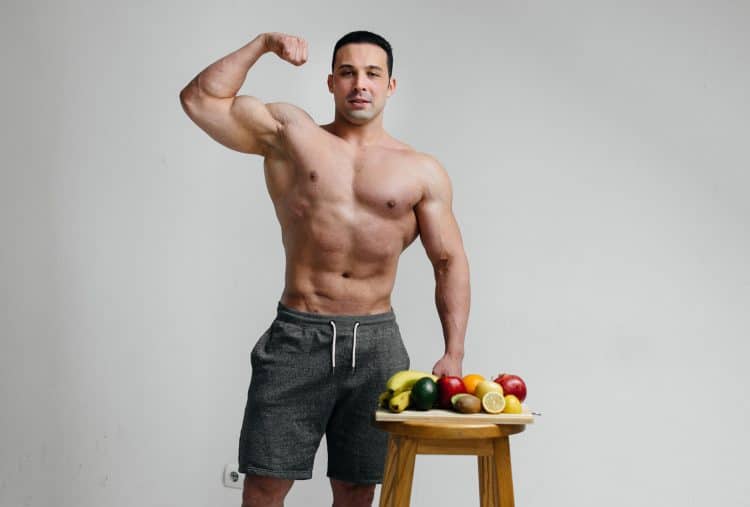Plant-based protein can be as effective as animal protein for building muscle, but absorption rates and amino acid profiles differ. Plant proteins offer a complete profile when diverse sources are combined, while animal protein has more leucine for fast muscle stimulation.
Ever since the rise of the vegan movement, the plant versus animal-based protein debate has been steadily heating up.
A study published in the Nutrients journal concluded that animal protein tends to be more beneficial for lean mass than plant protein, especially in younger adults (1). However, other studies show that plant-based proteins can be as effective as animal protein for hypertrophy. (2)
So, who should you listen to?
I spent over 50 hours researching the subject and have compiled the latest industry-expert opinions and studies to find an answer.
Understanding Protein Needs
Protein is the building block of muscle. You break muscle tissue during a training session, leading to micro tears. Protein, via its amino acid content, helps fix these cracks and makes the muscles grow bigger and stronger during the recovery period.
This is the reason it is almost impossible to imagine a bodybuilder’s diet devoid of chicken, steak, or whey protein shakes.
With the rise of plant-based protein, lifters training for hypertrophy have more diet options than ever.
However, you must know the difference between the two protein sources to determine which is right for you.
Animal protein is considered complete as it contains all 20 amino acids, whereas depending on the source, plant proteins lack a few amino acids needed for protein synthesis.
Amino Acids: Where the Magic Happens
Here is what you must know about amino acids:
- Essential Amino Acids: The human body cannot make the nine essential amino acids on its own and must get them from food. EAAs are critical for muscle growth.
- Non-Essential Amino Acids: There are 11 non-essential amino acids, and your body can produce them on its own through food.
Complete proteins contain all nine essential amino acids. Most plant-based proteins are incomplete proteins as they lack some of these EAAs. Conversely, most animal-based proteins are complete protein sources.
“If you are looking at animal-source protein, whether it is meat, eggs or milk, basically all of the amino acids that a human would need are in those because [the food sources] are all mammals, except chicken. We all have the same amino acid profile, the same proteins,” said Don Layman, Ph.D., a professor of Food Science and Human Nutrition at the University of Illinois Urbana-Champaign.
According to some experts, the protein quality score for building muscle depends on three amino acids: lysine, methionine, and leucine.
How Much Protein Do Bodybuilders Need For Building Muscle?
If you are serious about your gains, you have probably asked this question.
While the daily recommended protein intake recommendations for adults generally hover around 0.8 grams per kilogram of body weight, most people cannot get jacked on this amount of protein.
To maximize hypertrophy with resistance training, your daily protein intake should be around 1.6 to 2.2 grams per kilogram of body weight per day. (3)
Read also: How Much Protein Is Too Much?
Digestibility: Plant-Based Protein vs. Animal Protein
How much protein you eat daily is one thing; how much of it you digest is another.
Your body must break down the protein you consume into individual pieces to make it bioavailable and useful for muscle growth.
“Protein in plants is attached to fibers and structures. Plants have protein attached to leaves, stems, fruits, roots, flowers, and seeds. If you eat isolated plant protein in the raw form, only 60 to 70 percent of it would be digestible, compared to 95 percent in the case of isolated animal protein,” said Layman.
What does this mean?
“If a wheat flour protein product says it has 4 grams of protein per serving, it actually has less than 2 grams that would be digestible,” said Layman.
Layman added that these discrepancies can make building plant-based diet plans more complicated, and you will need much more careful planning and execution to build muscle on plant-based diets.
In the isolated form, your body is better designed to digest animal proteins.
“Animal protein is more easily digested and absorbed than plant protein. Plus, it’s the best source of omega-3 fats, vitamin B12, calcium, vitamin D, iron, and creatine,” said Kate Cohen, a registered dietitian at the Ellison Clinic at Saint John’s.
That said, meat, especially red meat, is often higher in saturated fat and may also increase the risk of several cancers, including colorectal cancer.
Is Building Muscle on a Vegan Diet a Lost Cause?
This isn’t true.
The latest research shows that plant-based protein might not be as bad as initially thought.
Dr. Stuart Phillips (PhD), a professor of kinesiology at McMaster University in Ontario, Canada, weighed in with the latest updates.
“A variety of contrived (manufactured foods) plant-based protein sources are very high-quality proteins. They are not something people need to worry about in terms of if they are getting an ‘inferior’ source of protein.”
However, you do need to make some adjustments in your diet to prioritize building muscle on a vegan diet.
“You can make up for the lack of nutrient content in plant-based proteins by either eating a little more in terms of food quantity, or you go toward supplements or foods that have actually taken some of the anti-nutritional elements (like fiber) out through cooking.”
Phillips added that most people don’t usually follow a radical dieting approach. They maintain a balance between protein and animal-based protein sources. Eating both types of foods in a single meal can help even out the nutrition profile and bioavailability.
The Science Behind Plant-Based Muscle Gain
Recent research can make plant-based athletes interested in building muscle jump with joy.
A study published in the International Journal of Environmental Research and Public Health comparing young, healthy adults on vegan and omnivore diets (while both groups lifted weights) demonstrated virtually identical muscle growth. (4)
However, when it comes to older adults, more research is needed to fully understand the effects of plant-based diets on muscle mass and strength.
The Game Changers
The vegan movement peaked in 2019 with the release of the Netflix documentary The Game Changers. It featured elite athletes like Lewis Hamilton, Scott Jurek, Patrik Babooumian, and seven-time Mr. Olympia champion Arnold Schwarzenegger advocating a plant-based diet.
The list of elite athletes joining the vegan movement is growing bigger and stronger each day.
Tips For Maximizing Muscle Gains on a Plant-Based Diet
Here’s how to make the most of your vegan diet:
Watch Your Aminos
People on a plant-based diet should commit the time to learn about the amino acid content of different foods and favor foods with a complete protein profile.
Combine Different Food Sources
Most plant-based foods lack at least one essential amino acid. You should combine multiple vegan foods in your diet to ensure a complete amino acid profile. Combos like beans and rice or hummus with whole-grain pita are a good place to start.
Quantity Counts
Plant-based proteins usually contain less protein per serving compared to their animal-based substitutes. Furthermore, since vegan protein is less bioavailable, you must eat a greater quantity of the food source to meet your daily protein intake goal.
I recommend working with a certified nutritionist to determine your ideal daily protein target and choosing suitable food sources to meet it.
Supplements
Plant-based protein powders can be an excellent way to meet your protein targets. Furthermore, some vegan protein sources like soy isolate are highly bioavailable and can be suitable for people who cannot manage to eat a high quantity of food.
Building Your Plant-Powered Plate: Plant-Based Foods To Eat
Are you looking to switch to a plant-based diet but are not sure where to start? Don’t worry; I’ve got you covered.
Here are some of the best foods to include in your vegan diet program:
- Tofu and Tempeh: These are soy-based foods packed with a high-amount of complete proteins.
- Lentils and Beans: They are perfect for any and every situation and contain a healthy amount of protein, fiber, and other essential nutrients.
- Legumes: These budget-friendly protein sources can help you keep full for a long time. Chickpeas, black beans, and kidney beans are among the most popular choices.
- Nuts and Seeds: They make for perfect snacks and contain an ample amount of protein and fats.
- Protein Powders: You can never go wrong with these. However, you must choose a high-quality vegan protein powder (peak, hemp, or soy) for the best results.
Sample Plant-Based High-Protein Meal Plan
Below is a simple vegan diet plan to help get you started on your muscle-building journey:
- Breakfast: Oatmeal topped with berries, nuts, and a scoop of vegan protein powder
- Lunch: Lentil soup with whole-grain bread
- Dinner: Tempeh stir-fry with brown rice and veggies
- Snacks: Peanut butter on rice cakes
Feel free to change the diet depending on what suits your lifestyle. Remember, the best diet for you is the one you can stick to for the long term.
Conclusion
Animal-based protein has long held the crown for the most anabolic food source for building muscle, but recent research shows that strategic plant-based eating can be as effective for helping you achieve your bodybuilding ambitions.
Factors like genetics, training, diet, and recovery program also play a crucial role in your bodybuilding quest.
Most nutrition experts recommend eating a balance of protein and animal-based foods in each meal to plug the nutritional gaps in your diet.
If you have any questions about plant-based protein and animal protein, drop them in the comments below, and I’ll be happy to help!
References
Fitness Volt is committed to providing our readers with science-based information. We use only credible and peer-reviewed sources to support the information we share in our articles.
- Lim MT, Pan BJ, Toh DWK, Sutanto CN, Kim JE. Animal Protein versus Plant Protein in Supporting Lean Mass and Muscle Strength: A Systematic Review and Meta-Analysis of Randomized Controlled Trials. Nutrients. 2021;13(2):661. Published 2021 Feb 18. doi:10.3390/nu13020661
- Monteyne, A. J., Coelho, M. O. C., Murton, A. J., Abdelrahman, D. R., Blackwell, J. R., Koscien, C. P., Knapp, K. M., Fulford, J., Finnigan, T. J. A., Dirks, M. L., Stephens, F. B., & Wall, B. T. (2023). Vegan and Omnivorous High Protein Diets Support Comparable Daily Myofibrillar Protein Synthesis Rates and Skeletal Muscle Hypertrophy in Young Adults. The Journal of Nutrition, 153(6), 1680–1695. https://doi.org/10.1016/j.tjnut.2023.02.023
- Stokes T, Hector AJ, Morton RW, McGlory C, Phillips SM. Recent Perspectives Regarding the Role of Dietary Protein for the Promotion of Muscle Hypertrophy with Resistance Exercise Training. Nutrients. 2018;10(2):180. Published 2018 Feb 7. doi:10.3390/nu10020180
- Isenmann E, Eggers L, Havers T, Schalla J, Lesch A, Geisler S. Change to a Plant-Based Diet Has No Effect on Strength Performance in Trained Persons in the First 8 Weeks-A 16-Week Controlled Pilot Study. Int J Environ Res Public Health. 2023;20(3):1856. Published 2023 Jan 19. doi:10.3390/ijerph20031856
Tip: If you're signed in to Google, tap Follow.












